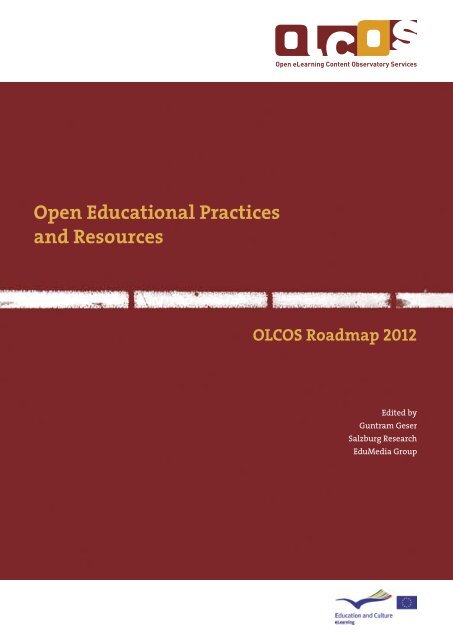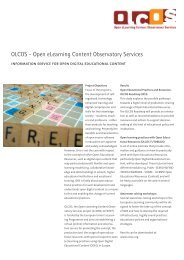Executive Summary (PDF) - OLCOS
Executive Summary (PDF) - OLCOS
Executive Summary (PDF) - OLCOS
Create successful ePaper yourself
Turn your PDF publications into a flip-book with our unique Google optimized e-Paper software.
Open Educational Practices<br />
and Resources<br />
<strong>OLCOS</strong> Roadmap 2012<br />
Edited by<br />
Guntram Geser<br />
Salzburg Research<br />
EduMedia Group
Project information and imprint<br />
Project information and imprint<br />
Open e-Learning Content Observatory Services (<strong>OLCOS</strong>)<br />
<strong>OLCOS</strong> is a Transversal Action funded by the European Commission under the eLearning<br />
Programme.<br />
Duration: January 2006 – December 2007<br />
Website: www.olcos.org<br />
Project partners<br />
European Centre for Media Competence, Germany<br />
European Distance and E-Learning Network, Hungary<br />
FernUniversitaet in Hagen, Germany<br />
Mediamaisteri Group, Finland<br />
Open University of Catalonia, Spain<br />
Salzburg Research, Austria<br />
Project coordinator<br />
Salzburg Research / EduMedia Group<br />
Veronika Hornung-Prähauser<br />
Jakob Haringer Straße 5/III, A-5020 Salzburg, Austria<br />
veronika.hornung@salzburgresearch.at<br />
Tel. 0043-662-2288-405<br />
<strong>OLCOS</strong> roadmap editor<br />
Guntram Geser, Salzburg Research / EduMedia Group, Austria<br />
Contributors to the <strong>OLCOS</strong> roadmap<br />
FernUniversitaet in Hagen: Peter Baumgartner and Viola Naust<br />
Open University of Catalonia: Agustí Canals, Núria Ferran, Julià Minguillón<br />
and Mireia Pascual<br />
Mediamaisteri Group: Mats Rajalakso and Timo Väliharju<br />
Salzburg Research: Wernher Behrendt, Andreas Gruber, Veronika Hornung-Prähauser<br />
and Sebastian Schaffert<br />
Graphics & layout<br />
Jesper Visser, Salzburg Research<br />
3
Project information and imprint<br />
Images<br />
Based on copyright-free photographs<br />
from www.imageafter.com<br />
Print version<br />
ISBN 3-902448-08-3<br />
Printed in Austria<br />
January 2007<br />
Online<br />
A digital version of this report can be freely<br />
downloaded from www.olcos.org<br />
Copyright<br />
This work is licensed under the Creative Commons<br />
Attribution–NonCommercial–ShareAlike 2.5 License<br />
http://creativecommons.org/licenses/by-nc-sa/2.5/<br />
Disclaimer<br />
This publication was produced by the <strong>OLCOS</strong> Project with the financial support of the<br />
European Commission.<br />
The content of this report is the sole responsibility of <strong>OLCOS</strong> and its project partners.<br />
Furthermore, the information contained in the report, including any expression of opinion and<br />
any projection or forecast, does not necessarily reflect the views of the European Commission<br />
and in no way anticipates any future policy plans in the areas addressed in this report.<br />
The information supplied herein is without any obligation and should be used with the<br />
understanding that any person or legal body who acts upon it or otherwise changes its position<br />
in reliance thereon does so entirely at their own risk.<br />
4
<strong>Executive</strong> summary<br />
1 <strong>Executive</strong> <strong>Summary</strong><br />
As a Transversal Action under the European eLearning Programme, the Open e-Learning<br />
Content Observatory Services (<strong>OLCOS</strong>) project carries out a set of activities that aim at fostering<br />
the creation, sharing and re-use of Open Educational Resources (OER) in Europe and beyond.<br />
OER are understood to comprise content for teaching and learning, software-based tools<br />
and services, and licenses that allow for open development and re-use of content, tools and<br />
services.<br />
The <strong>OLCOS</strong> road mapping work was conducted to provide decision makers with an overview<br />
of current and likely future developments in OER and recommendations on how various<br />
challenges in OER could be addressed.<br />
While the results of the road mapping will provide some basis for policy and institutional<br />
planning, strategic leadership and decision making is needed for implementing measures that<br />
are likely to promote a further uptake of open educational practices and resources.<br />
OER are understood to be an important element of policies that want to leverage education<br />
and lifelong learning for the knowledge economy and society. However, <strong>OLCOS</strong> emphasises<br />
that it is crucial to also promote innovation and change in educational practices.<br />
In particular, <strong>OLCOS</strong> warns that delivering OER to the still dominant model of teachercentred<br />
knowledge transfer will have little effect on equipping teachers, students and workers<br />
with the competences, knowledge and skills to participate successfully in the knowledge<br />
economy and society.<br />
This report emphasises the need to foster open practices of teaching and learning that are<br />
informed by a competency-based educational framework. However, it is understood that a shift<br />
towards such practices will only happen in the longer term in a step-by-step process. Bringing<br />
about this shift will require targeted and sustained efforts by educational leaders at all levels.<br />
The road mapping work covers the following areas:<br />
| Policies, institutional frameworks and business models;<br />
| Open Access and open content repositories;<br />
| Laboratories of open educational practices and resources.<br />
For each of these areas, drivers/enablers and inhibitors of OER and open educational<br />
practices are identified and described in detail. The results are summarised in Roadmap Briefs,<br />
which may be used as starting points for discussing initiatives in OER and open educational<br />
practices on a strategic level.<br />
Among the critical inhibitors that have been identified the following three should receive<br />
particular attention:<br />
| In order to see researchers and educators excel in OER, academic and educational institutions<br />
will need to implement appropriate mechanisms of recognition and reward.<br />
| Business models in OER will remain tricky. The right mix of income streams must be found,<br />
and there will be growing competition for scarce funding resources.<br />
| Regarding educational repositories at present there exists little experience in how to effectively<br />
support communities of practice, which is of critical importance if OER initiatives want to<br />
grow based on user contributions.<br />
12
<strong>Executive</strong> summary<br />
With respect to potential drivers/enablers, the following three are among those of general<br />
importance:<br />
| The urgency of the lifelong learning agenda in Europe and beyond makes OER initiatives<br />
targeted at driving participation particularly welcome.<br />
| Whereas current OER initiatives focus mainly on providing access to static course material,<br />
a new generation of easy-to-use Web-based tools and services provides opportunities to offer<br />
potentially more effective OER.<br />
| For authors and institutions who wish to provide OER while retaining some copyrights,<br />
the set of Creative Commons licenses allows for doing so in an internationally standardised<br />
way.<br />
However, these points are only a limited selection of observations from <strong>OLCOS</strong>’ much<br />
broader assessment of issues and developments in OER and open educational practices.<br />
Based on the road mapping results the <strong>OLCOS</strong> report provides a more comprehensive set<br />
of recommendations for the following decision makers and stakeholders:<br />
| Educational policy makers and funding bodies;<br />
| Boards, directors and supervisors of educational institutions;<br />
| Teachers;<br />
| Students;<br />
| Educational repositories;<br />
| Developers and implementers of e-learning tools and environments.<br />
The <strong>OLCOS</strong> Project Consortium invites decision makers and stakeholders in OER to<br />
consult the project website, www.olcos.org, for further information on ongoing activities and<br />
other products.<br />
We welcome comments and suggestions on our products as well as the opportunity to<br />
establish cooperation with other ongoing projects and new initiatives in OER and open<br />
educational practices.<br />
13



